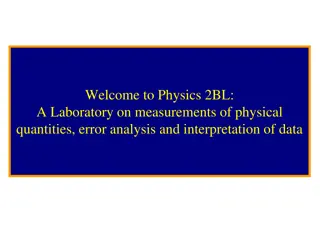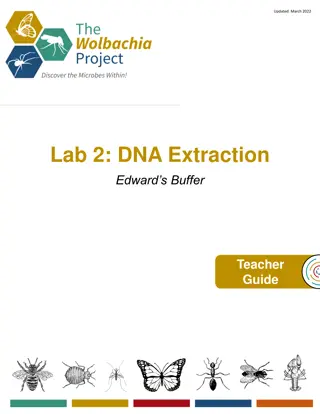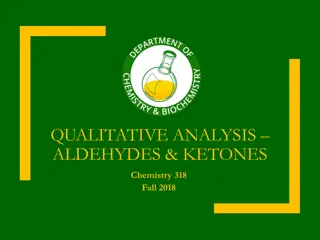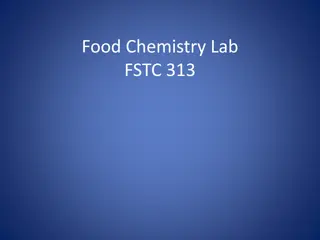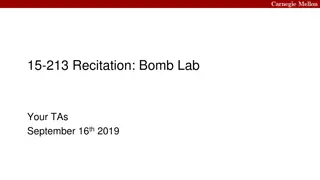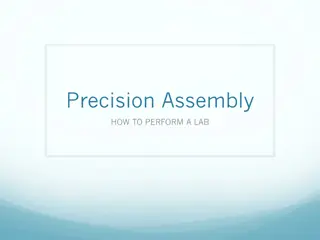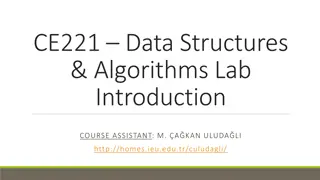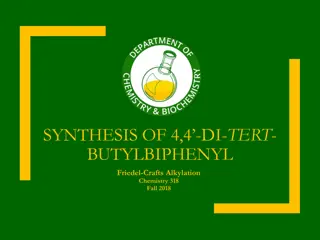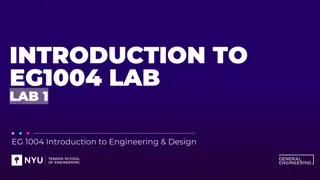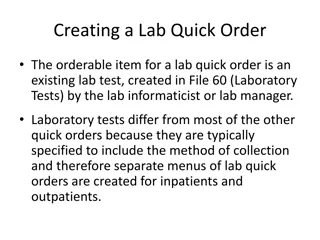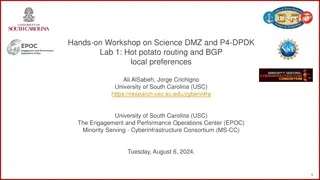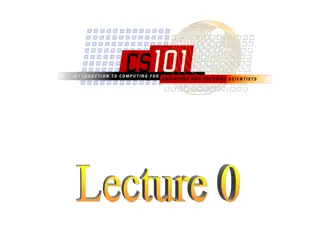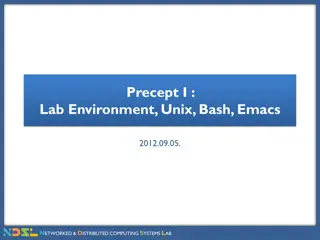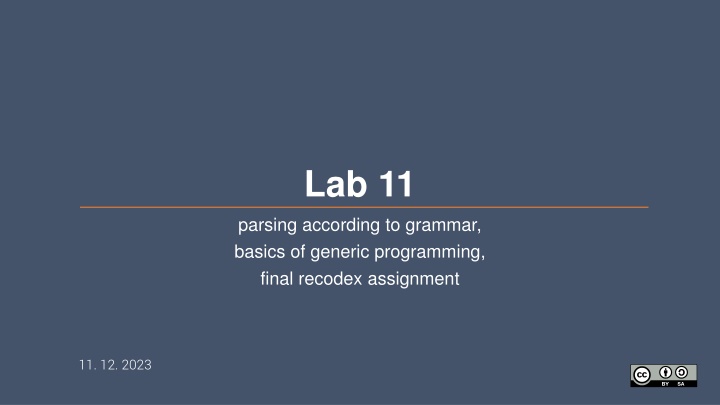
Parsing and Generic Programming Basics for C++ Labs
Explore the fundamentals of parsing according to grammar and generic programming through an overview of lab assignments and resources for C++ labs. Topics covered include parsing basic language constructs, generic programming with templates, and pointers to related tasks and assignments. Discover how to parse programming languages, including arithmetic expressions, and get insights into compilers' front-end, token derivation, and intermediate code generation. Dive into formal grammars, source code analysis, and symbol tables for a holistic understanding of C++ programming in a lab setting.
Download Presentation

Please find below an Image/Link to download the presentation.
The content on the website is provided AS IS for your information and personal use only. It may not be sold, licensed, or shared on other websites without obtaining consent from the author. If you encounter any issues during the download, it is possible that the publisher has removed the file from their server.
You are allowed to download the files provided on this website for personal or commercial use, subject to the condition that they are used lawfully. All files are the property of their respective owners.
The content on the website is provided AS IS for your information and personal use only. It may not be sold, licensed, or shared on other websites without obtaining consent from the author.
E N D
Presentation Transcript
Lab 11 parsing according to grammar, basics of generic programming, final recodex assignment 11. 12. 2023
Outline 1. Parsing basic language 2. Generic programming with templates 3. Not-task 11 (you don't need to submit this) 4. Final recodex assignment 2023/2024 2 Programming in C++ (labs)
The starting code in public GitLab https://gitlab.mff.cuni.cz/teaching/nprg041/mejzlik/labs-cpp-pub 2023/2024 3 Programming in C++ (labs)
From the previous tasks Materializing C++20 non-owning views Using iterators + ctors auto xs_view = std::views::iota(1, 10); // Materialize the range into a vector std::vector<int> xs(xs_view.begin(), xs_view.end()); std::ranges::copy(xs, std::ostream_iterator<int>(std::cout, " ")); C++23: https://en.cppreference.com/w/cpp/ranges/to // Materialize the range into a vector with adaptor auto xs = std::views::iota(1, 10) | std::ranges::to<std::vector<int>>(); std::ranges::copy(xs, std::ostream_iterator<int>(std::cout, " ")); 2023/2024 5 Programming in C++ (labs)
How to parse a programming language? NSWI098 - Compiler Principles NSWI109 - Compilers Construction There is a whole set of courses for that Let's start with arithmetic expressions prefix notation - * + 2 2 3 10 simple solution by using stack postfix notation 2 2 + 3 * 10 - simple solution by using stack infix notation (((2 + 2) * 3) - 10) Bit more complicated We'll take a general approach from compilers Also using formal grammars 2023/2024 7 Programming in C++ (labs)
High-level view at compilers' front-end Get next token Derivation tree Source code Lexical analysis Syntax analysis Semantic analysis machine code back-end Token Intermediate code Symbol tables 2023/2024 8 Programming in C++ (labs)
Our grammar | A |+|M| 10 * (1 + 4 * 2) + 2 * 2 + 1 For basic arithmetic expressions With + and *, () It is context-free grammar | A |+| M |+|M| 10 * (1 + 4 * 2) + 2 * 2 + 1 | M |+| M |+|M| 10 * (1 + 4 * 2) + 2 * 2 + 1 1. A A + M 2. A M 3. M M * P 4. M P 5. P ( A ) 6. P lit |M |*| P |+|2|*|2|+|1| 10 * (1 + 4 * 2) + 2 * 2 + 1 Terminals are orange |M |*|( A )|+|2|*|2|+|1| 10 * (1 + 4 * 2) + 2 * 2 + 1 Non-terminals are black |10|*|( A )|+|2|*|2|+|1| 10 * (1 + 4 * 2) + 2 * 2 + 1 |10|*|(A|+| M |)|+|2|*|2|+|1| 10 * (1 + 4 * 2) + 2 * 2 + 1 |10|*|(1|+|M|*|P|)|+|2|*|2|+|1| 10 * (1 + 4 * 2) + 2 * 2 + 1 |10|*|(1|+|4|*|2|)|+|2|*|2|+|1| 10 * (1 + 4 * 2) + 2 * 2 + 1 2023/2024 9 Programming in C++ (labs)
It is left-recursive Problem if we try to implement recursive descent parsing Mechanical transformation that eliminates this property 1. A A + M 2. A M 3. M M * P 4. M P 5. P ( A ) 6. P lit A A A A A A A A Eliminating recursive rule 1 A MA A A :: : + M A + MA A A :: : M 2023/2024 10 Programming in C++ (labs)
We transform it to grammar that is not left-recursive Problem if we try to implement recursive descent parsing There must not be a rule that would cause our code to recurse infinitely Mechanical transformation that eliminates this property 1. A MA 2. A + MA 3. A 4. M PM 5. M * PM 6. M 7. P ( A ) 8. P lit 1. A A + M 2. A M 3. M M * P 4. M P 5. P ( A ) 6. P lit Empty string, sometimes 2023/2024 11 Programming in C++ (labs)
Recursive-descent parsing Implement one function for each non-terminal The function does two things: Decide what production will be used (the expansions on the right side) based on look-ahead (constant number of tokens to follow) Recursivelly process the terminals and non-terminals from the right side terminals -> check if the terminal is the same with look-ahead (next token), else error non-terminals -> call their functions 1. A MA 2. A + MA | 3. M PM 4. M * PM | 5. P ( A ) | lit 2023/2024 12 Programming in C++ (labs)
Recursive-descent parsing 1. A MA 2. A + MA | 3. M PM 4. M * PM | 5. P ( A ) | lit void A() { M(); Aap(); } void Aap() { if(_lookahead=='+') { match('+'); M(); Aap(); } } void M(void) { P(); Map(); } void Map(void) { if(_lookahead=='*') { match('*'); P(); Map(); } } void P(void) { switch(_lookahead) { case '(': match('( ); A(); match(')'); break; case 'lit': match('lit'); break; default: throw syntax_error(); } } Tok _lookahead; Tok nexttoken() { ... } void match(token t) { if(_lookahead == t) _lookahead = nexttoken(); else throw syntax_error(); } 2023/2024 13 Programming in C++ (labs)
It is flexible Context-free grammar without left-recursion is recipe on how to implement the parser! Do you want to add unary - for literals and parentheses? No problem 1. A MA 2. A + MA | 3. M PM 4. M * PM | 5. P ( A ) | lit |- P void P(void) { switch(_lookahead) { case '(': match('('); A(); match(')'); break; case 'lit': match('lit'); break; case '-': match('- ); P(); break; default: throw syntax_error(); } } 2023/2024 14 Programming in C++ (labs)
It is flexible Context-free grammar without left-recursion is recipe on how to implement the parser! Do you want to add binary - with the same precendce as +? No problem 1. A MA 2. A + MA | - MA | 3. M PM 4. M * PM | 5. P ( A ) | lit |- P 2023/2024 15 Programming in C++ (labs)
It is flexible Context-free grammar without left-recursion is recipe on how to implement the parser! Do you want to assignment to variables? No problem Lookahead of 2 tokens, or one token for ident with = 1. S ident = A | A 2. A MA 3. A + MA | - MA | 4. M PM 5. M * PM | 6. P ( A ) | lit |ident |- P 2023/2024 16 Programming in C++ (labs)
Example code Example implementation for expression evaluation is in the repo https://gitlab.mff.cuni.cz/teaching/nprg041/mejzlik/labs-cpp-pub/- /blob/master/lab_11/parser/parser.cpp 2023/2024 17 Programming in C++ (labs)
2) Generic programming with templates
Motivation Reuse code with copy-paste Lot of work Fixing bugs in multiple places int min(int a, int b){ return (a < b) ? a : b; } double min(double a, double b){ return (a < b) ? a : b; } string min(string a, string b){ return (a < b) ? a : b; } struct int_node { int_node* next; int value; }; struct int_list { int_node* front; int_node* back; }; void int_list_append(int_list* l, int val); void int_list_prepend(int_list* l, int val); void int_list_clear(int_list* l); struct double_node { double_node* next; double value; }; struct double_list { double_node* front; double_node* back; }; double dbl_list_append(int_list* l, double val); void dbl_list_prepend(int_list* l, double val); void dbl_list_clear(int_list* l); 2023/2024 19 Programming in C++ (labs)
Motivation You can write C preprocessor abominations They invite for mistakes #define BUILD_COMPARE(TYPE) \ int cmp_ ## TYPE(const void* va, const void* vb) \ { \ TYPE const* pa = static_cast<TYPE const*>(va); \ TYPE const* pb = static_cast<TYPE const*>(vb); \ \ if (*pa < *pb) return -1; \ else if (*pa == *pb) return 0; \ else return 1; \ } BUILD_COMPARE(float) BUILD_COMPARE(double) void h() { float data[4] = { 4.0, 3.0, 2.0, 1.0 }; qsort(&data[0], 4u, sizeof(float), &cmp_float); //- OK qsort(&data[0], 4u, sizeof(float), &cmp_dbl); //- Error } 2023/2024 20 Programming in C++ (labs)
What is generic programming? Generic programming is a method to implement algorithms and data structures in the most general sensible way. Algorithms are written in terms of types to-be-specified-later. Generic programming helps us to reduce redundancy and programming effort, while it increases reusability and flexibility. C++ uses templates for generic programming Generic programming centers around the idea of abstracting from concrete, efficient algorithms to obtain generic algorithms that can be combined with different data representations to produce a wide variety of useful software. David Musser, Alexander Stepanov Generic Programming (1988) Lift algorithms and data structures from concrete examples to their most general and abstract form. Bjarne Stroustrup Evolving a language in and for the real world: C++ 1991-2006 (2007) 2023/2024 21 Programming in C++ (labs)
Templates Templates are a kind of pattern for the compiler We can instantiate templates with different types or values Each instantiation for a new type or value results in additional code Templates reduce a lot of writers work We do not have to implement functions multiple times just because it s a slightly different type. There are different types of templates: Class templates Function templates Method templates Alias template (C++11) Variable templates (C++14) Lambda template (C++20) Templates are always initiated by the keyword template. <SOMETHING> template NOT template <SOMETHING> 2023/2024 22 Programming in C++ (labs)
Kinds of template parameters There are three kinds of template parameters: Type parameter Represents a type - int, char, user-defined classes Non-type template parameter (NTTP) Values of concrete type (e.g. constants) These must be evaluated at compile time Template-template paramter If passing template as a parameter to a template You will not see these that often 2023/2024 23 Programming in C++ (labs)
Catches of templates The compiler must see the template definition when new instantiation is required Thus, we write definitions directly into .hpp files Our compiler must see definition of std::vector template, because it works also with our user- defined types Compiler is able to deduce many of template types And with newer compilers it gets better There is a tool that helps you understand templates CppInsights by Andreas Fertig e.g.: https://cppinsights.io/s/a031868c 2023/2024 24 Programming in C++ (labs)
Function templates Recipes for making functions There are no implicit conversions for template parameters https://cppinsights.io/s/a031868c typename or class, they do the same template<typename T> T const& min(T const& a, T const& b) { return (a < b) ? a : b; } No implicit conversions! int main() { min(10.0, 12.0f); // Bad, no overload for (double, float) min(10.0, 12.0); // OK } template<> T const& min(double const& a, double const& b) { return (a < b) ? a : b; } 2023/2024 25 Programming in C++ (labs)
(Partial) template specializations If you need to treat some template parameters differently https://cppinsights.io/s/a3c6063b template<typename T> bool equal(const T& a, const T& b) { return a == b; } This will be used for doubles // Explicit specialization template<> bool equal(const double& a, const double& b) { return std::abs(a - b) < 0.00001; } void main() { int a = 2; int b = 1; std::cout << equal(a, b) << std::endl; double d = 3.0; double f = 4.0; std::cout << equal(d, f) << std::endl; Will this work? No, still template std::cout << equal(d, 4.0f) << std::endl; } 2023/2024 26 Programming in C++ (labs)
Class templates Default template parameter values must come last Recipes for making classes methods implemented outside of the class definition require template head before them https://cppinsights.io/s/da985276 template<typename T, size_t SIZE = 10> struct Array { T* data(); const T* data() const { return std::addressof(mData[0]); } constexpr size_t size() const { return SIZE; } T* begin() { return data(); } T* end() { return data() + size(); } T& operator[](size_t idx) { return mData[idx]; } T mData[SIZE]; }; template<typename T, size_t SIZE> T* Array<T, SIZE>::data() { return std::addressof(mData[0]); } Template head required int main() { Array<int, 2> ai{3, 5}; Array<double, 2> ad{2.0}; } 2023/2024 27 Programming in C++ (labs)
Method templates Recipes for making member functions (methods) template<typename T> class Foo { public: Foo(const T& x) : mX{x} {} The class itself is a template template<typename U> Foo<T>& operator=(const U& u) { mX = static_cast<T>(u); return *this; } private: T mX; }; int main() { Foo<int> fi{3}; fi = 2.5; // static cast downcasts that into 2 } The compiler deduced the type U 2023/2024 28 Programming in C++ (labs)
Templates work also with inheritance Class templates and classes can inherit from each other just fine When deriving from a class template, the methods and classes are not automatically visible Just use this-> explicitly template<typename T> class Foo { public: void Func() {} }; template<typename T> class Bar : public Foo<T> { public: void BarFunc() { // Func(); // This line is incorrect if uncommented. this->Func(); Foo<T>::Func(); } }; 2023/2024 29 Programming in C++ (labs)
Alias templates Recipes for making type aliases template<typename T> using MyVector = vector<T, my_special_allocator<T>>; MyVector<float> fv; template<typename Key, typename Val> using MyMap = map<Key, Val, greater<Key>>; MyMap<std::string, int> msi; 2023/2024 30 Programming in C++ (labs)
Variable templates Recipes for making variables template<typename T> inline constexpr T pi = T(3.1415926535897932385L); template<typename T> T circular_area(T r) { return pi<T> *r * r; } template<typename T> inline constexpr bool is_arithmetic_v = is_arithmetic<T>::value; // For int usage void init(int* p, size_t N) { memcpy(p, 0, sizeof(T) * N); } template<typename T> void init(T* p, size_t N) { if constexpr (is_arithmetic<T>) memcpy(p, 0, sizeof(T) * N); else uninitialized_fill_n(p, N, T()); } // For MyVec usage void init(MyVec* p, size_t N) { uninitialized_fill_n(p, N, MyVec()); } 2023/2024 31 Programming in C++ (labs)
Lambda templates Recipes for making lambdas OK, writing lambdas -> `[]<>(){}` :) auto multiply = []<typename T>(T a, T b) { return a * b; }; auto d0 = multiply(1.0, 2.0); 2023/2024 32 Programming in C++ (labs)
Task 10: Query processor with ranges Take the GoodVec from Task 07 and make it generic code 2023/2024 34 Programming in C++ (labs)
The final ReCodex assignment is up! You need this to pass the term test 8. 1. 2024! Code this assignment with extensions in mind! It will save you time during the test! Fantasy battle simulator! https://recodex.mff.cuni.cz/app/assignment/8681cf5c-a3bd-4449-89eb-91ae09ebff91 https://gitlab.mff.cuni.cz/teaching/nprg041/mejzlik/labs-cpp-pub/-/blob/master/recodex/battle- sim/assignment/battle-sim.md 2023/2024 36 Programming in C++ (labs)
(Mock) Term test Using only lab computers Try it at least once! How to run e.g. Visual Studio, how to set it up etc These are dual-boot if you want The only allowed sites: https:// cppreference.com https://recodex.mff.cuni.cz/ https://gitlab.mff.cuni.cz/ The extension will be as a separate ReCodex assignment Submit to ReCodex, there will be some new test cases regarding the new functionality There will be manual inspection and grading (pass/fail) But the green tests are a good start 2023/2024 37 Programming in C++ (labs)
Lab wrap up You should know basics of templates and how to write basic generic code how to parse basic languages Next lab: Mock term test Your tasks until the next lab: Pimp your ReCodex homework CliParser for mock term test Code your ReCodex homework battle-sim for the term test 2023/2024 38 Programming in C++ (labs)




